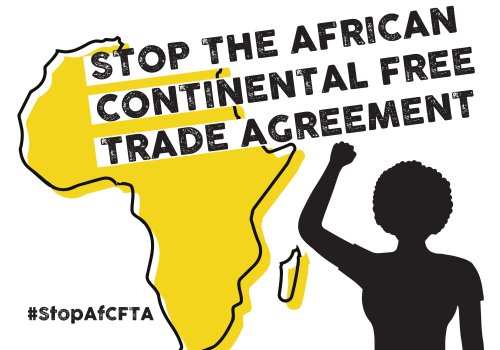bilaterals.org & GRAIN | 10 October 2023
AfCFTA: More free trade? For whose benefit?
Download the factsheet in pdf format
Since the early 2000s, Africans said “NO TO EPAs” (Economic Partnership Agreements) that were being pushed by Europe to continue its colonial plunder of the global South. Now, another neoliberal project is looming over the African continent: the African Continental Free Trade Area (AfCFTA).
This mega trade agreement is an initiative of the African Union (AU), supported by major economic players such as the United States, the European Union, China, the African Development Bank, the United Nations Conference on Trade and Development, the World Trade Organisation (WTO) and the World Bank. It is aimed at consolidating African markets, boosting trade within the continent and reinforcing regional integration. It has been signed by 54 of the 55 AU member states. While it entered into force in 2019, some of its trade rules have been operational since 2022 and only between seven states. The AfCFTA aims to liberalise 97% of inter-African trade in goods. It also sets rules on trade in services, as well as intellectual property, investment and e-commerce. The negotiating process has lacked transparency, with information only available through leaked texts.
Trade in Africa has always been conducted informally by small scale traders, the majority of whom are women. The AfCFTA overlooks this reality, and focuses on boosting competition among corporations.
So what does this trade deal mean for ordinary Africans in a time of deep climate, economic and food crises?
Pushing the agribusiness agenda
Peasant agriculture and African food systems stand to be undermined by AfCFTA. One powerful threat is that it may strengthen the criminalisation of farmers’ seeds. The AfCFTA’s draft intellectual property rights protocol pushes harmonised rules to “protect” plant varieties, genetic resources and traditional knowledge. This means turning them into private property. Seed companies will be able to prevent farmers from saving and exchanging protected seeds. As a result, biodiversity – the backbone of African food culture and the basis of food sovereignty - will be lost while the power of the food and agriculture industries will grow. It is unacceptable to grant anyone legal monopoly rights over seeds.
Workers’ rights on the line
To accelerate development, the AfCFTA text encourages operations in special economic zones (SEZs), where regulations are relaxed to attract investment. SEZs offer companies tax breaks and waivers from environmental and other laws. For workers, this means poor working conditions, low wages, poor sanitation, intensive hours, violence against women and prohibitions against unions. SEZs also lead to land dispossession and evictions, particularly where land is converted from agricultural to industrial use.
Access to medicines at risk
The AfCFTA includes intellectual property provisions which could hamper the importation and production of affordable generic medicines by local companies. An annex on patents will be added at a later stage, but the negotiation process is likely to remain closed to the public, even though it could have serious negative consequences for public health.
Corporations can sue governments
Leaked versions of the AfCFTA indicate that member states may be required to establish an investor-state dispute settlement mechanism (ISDS). This parallel justice system allows foreign investors to sue a state in a binding arbitration court if new laws or regulations negatively affect their expected profits or investment potential. The ISDS system is criticised the world over for allowing investors to change public policy of sovereign states. It also leads to massive penalties (billions of dollars) that have to be paid by the public. African governments have lost most of the 99 ISDS cases brought against them so far under bilateral investment treaties.
Digital trade and e-commerce
A digital trade protocol is under negotiation within the AfCFTA but its content is not publicly available. It is likely that this protocol will support the AU’s plan to establish a continental digital single market. This means removing legal and technical “barriers” to trade, such as measures widely adopted by African states to protect privacy. For example, it could ban localisation requirements that prevent sensitive data, such as that regarding personal health, from being processed outside one’s country. As only one-third of African people uses the internet on a regular basis, it is unclear who stands to benefit from the liberalisation of digital trade and e-commerce.
More debt for infrastructure
The AfCFTA is one of the signature projects of the AU’s Agenda 2063, which aims to develop intra-African infrastructure. It will promote large-scale projects that meet the demands of its state and corporate proponents, such as the Nacala Corridor, a 1,700-kilometre road and rail link between Mozambique, Malawi and Zambia. These costly mega-projects tend to enrich transnational corporations and generate more public debt for the countries where they are built. While infrastructure development is important, it must be in the public interest and not lead to additional debt. As a reminder, African countries’ external public debt amounted to US$44 billion in 2022.
NO to AfCFTA!
The AfCFTA is built on the dogma of free-market capitalism. It pushes a model of “development” hinged on increased trade and investment under the guise of pan-Africanism. However, it is “more of the same” trade rules that we see under the WTO and bilateral agreements. Therefore, it will likely only benefit African elites and transnational capital, at the expense of local communities.
For more information:
• bilaterals.org, “AfCFTA”, 2023, https://bilaterals.org/afcfta-287
• GRAIN, “What do FTAs mean for African women? A critical look into the African Continental Free Trade Area”, 2020, https://grain.org/e/6496
• Ibon Africa, “Scramble for Africa: A campaign primer on the African Continental Free Trade Area Agreement”, 2022, https://iboninternational.org/download/scramble-for-africa-afcfta-campaign-primer/
• ISDS Platform, https://isds.bilaterals.org/



